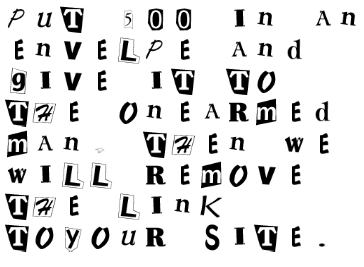Link Building Scam Alert: When Links Are Held Hostage
On November 1st I reached the 19 year mark as a content publicist/link builder. Nineteen years. I won’t bore you with how we went after links back then by rubbing two sticks together and sending up smoke signals. Smoke signal spam was not a big problem yet. I poke fun at myself but at the […]
On November 1st I reached the 19 year mark as a content publicist/link builder. Nineteen years. I won’t bore you with how we went after links back then by rubbing two sticks together and sending up smoke signals. Smoke signal spam was not a big problem yet.
I poke fun at myself but at the same time there are a few things that longevity is quite good for. First, I have seen just about every linking scheme ever created, whether by clients eager to get my opinion of them, by seeing them in a backlink analyses, or by being the recipient of a spam email trying to sell them to me.
Other advantages to linking longevity are being able to watch in real-time over time as the tools and techniques and strategies have changed. Getting to watch the search engines make changes to algorithms to both combat spam and improve result credibility.
Watching entire niche industries sprout up related to links, many of which are brilliant like this one, or downright moronic, (and I won’t link to them here, because there are just way too many).
Links Held Hostage?
With that backdrop, this past month I must admit I learned about a new linking related scam that I truly did not see coming. Links being held hostage.
I pride myself on knowing all things links. On knowing not just the obvious, but the arcane, the linking minutiae from the nooks and crannies that few people think about and which often ultimately help define success for clients.
But for the remainder of this column, I wanted to focus on alerting you to a scam that you may or may not have already been victimized by.
As a result of Google’s directive that webmasters make an effort to remove obviously spammy links (especially if you received the unnatural links warning), there are companies that are creating link spam networks, putting links to your site on those networks, providing details for how to reach them by e-mail, and then waiting for you to come ask them to remove these obviously spammy links.
The catch? They want you to give them money to take down the links. Links that you never put there in the first place.
In other words, there’s a new link network in town, and your site has taken up residence in that town without you knowing it, and the only way for you to move out is to pay a fee to have the moving company remove you.
That’s a nice metaphor for what really amounts to links held hostage. Link extortion might be a better term.
Regardless, the point here is that as often happens, there are unintended consequences to SEO and linking related actions and search engine efforts to identify spammers. This new niche of having to pay a ransom to have a link removed is just one of them. There are others, just not quite as clever.
But Wait, Can’t Link Disavow Help Save The Links?
Another scenario might be best labeld the “Preemptive Disavow”. What’s a preemptive disavow? It’s where you tell Google you want to disavow links pointing at your site even though they don’t actually point/link to your site. It’s for protection just in case they ever do. While that sounds silly, I’ve been asked that exact question more times than you might imagine.
The logic behind it seems sound. If you know about a spammy site that has linked to other sites in your niche, and you are worried that it might link to you and try to seek a ransom to have that link removed, why not just disavow that site before it has the chance to hold you hostage? Brilliant, right? I’m not so sure.
To me, every minute of time you spend not improving the content experience of your site but instead on cleaning up a perceived link mess that may or may not exist is a waste.
To be clear, I’m not saying that you shouldn’t try to clean up legitimate link messes that you yourself know you created, like when you made that decision to buy 150 exact match anchor text links from that link broker. That’s an obvious problem, and you need to clean it up, or at least try.
If those sites now are demanding a fee, and calling it an “administrative removal fee”, then as much as I think that’s a bogus thing to do, it’s their prerogative to do so. And I’d never pay that fee. I’d disavow a link before I’d pay one red cent to have it removed, because whether you call it extortion or ransom or links held hostage, it’s just wrong.
Though it might have been wrong in the first place to buy those links, don’t financially reward those who sold them to you be giving them still more money to take them down. Disavow them. While you’re in the disavow mode, in your comments section on your disavow file, let Google know about the link ransom scam.
I’m making a plea here to all ethical linkers. Don’t let the link extortionists succeed. Together maybe this is one link scam we can stop before it gets too big to stop, and before unknowing small businesses and less savvy webmasters get taken for a ride.
Opinions expressed in this article are those of the guest author and not necessarily Search Engine Land. Staff authors are listed here.
Related stories
New on Search Engine Land
